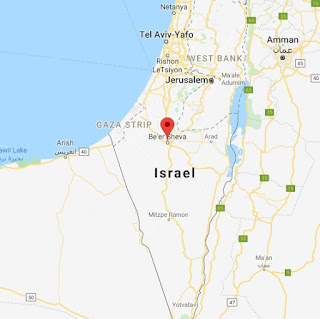Genesis 21:14 names it as the place where Hagar wandered with Yishma-El after leaving Be'er Lechi Ro'i.
Genesis 21:22 names it as the place where Av-Raham and Avi-Melech signed their treaty after resolving that most unfortunate mix-up over Sarah's marital status.
Genesis 22:19 finds Av-Raham returning here after the Akeda (the non-sacrifice of Yitschak), which is slightly off, because Sarah appears to be living at Chevron at this time.
Genesis 26:23 ff names it as the place where YHVH made his covenant with Yitschak, giving the place its name, from Sheva = "an oath".
Genesis 28:10 seems to have established it as the family base; it is from here that Ya'akov sets out for Padan Aram, though Genesis 25:11 had told us that the family were living at Be'er Lechi Ro'i, not at Be'er Sheva.
Genesis 46:1 finds Ya'akov stopping here to make sacrifice, en route to Mitsrayim, "to the god of his father Yitschak".
The text, despite the contradiction in Genesis 25:11, clearly wants us to regard Be'er Sheva as the patriarchal home, and not just a major shrine. Being in the desert it must have been a natural oasis. Traditionally and proverbially the southern border of Kena'an (Judges 20:1, 1 Samuel 3:20), somewhat surprisingly, given the distance across the Negev from there to the Red Sea.
Is the contradiction a matter of two tribal traditions in conflict?
2 Samuel 24:7 states that it was an ancient city, rather than just a well; whereas Be'er Lechi Ro'i seems to have been an oasis with an oracular shrine.
As to the meaning. It is usually rendered as Be'er Sheva = "the well of the oath", from Be'er (באר) = "well" + Sheva (שבע) = "an oath"; however there is also SAVA (שבע), with a Seen not a Sheen, which means "plenty", "abundance", "satisfaction"; Deuteronomy 31:20, Ruth 2:14, Isaiah 44:16, Amos 4:8 and others all use it to suggest spiritual as well as physical sustenance, and thus it becomes a logical epithet for an oasis, as Be'er Sheva was before it grew into a fully-fledged town. The only argument against this is that the Seen version may itself be a phonetic mis-spelling of Saba (סבע) = "to drink".
There is also the possibility of a link with the city of Sheba, from which one of Shelomoh's (Solomon's) wives would later come. This is immensely problematic to resolve because there are three different but connected contradictions within the Yehudit itself. Firstly the name Sheba, which Genesis 10:7 renders as Sheva (שְׁבָא) with an Aleph, naming him as one of the sons of Kush. But Genesis 25:3 also names him as Sheva, spelled the same, only now as a son of Yakshan (יָקְשָׁן), a son of Av-Raham who Genesis 10:28 tells us was not Yakshan but Yaktan (יָקְטָן) - the Sheen (ש) and Tav (ת) often interchange between Yehudit and Chaldean, so this is not a problem. All of which infers that Sheva is connected with the Sabaeans of what is today called the Yemen; except that, when these people do get a direct mention in the Bible (Isaiah 45:14 for example, but there are many examples in Ezekiel, Joel and Job), they are spelled (סבא) with a first letter Samech (ס) not a Sheen (ש), and a last letter Aleph (א) not an Ayin (ע). More on this Sheva in my notes - click here.
As to Kush, the "Ethiopian" city of Sheba was also named Saba, and the Yehudit spelling provides yet another variation (סבע), with a first letter samech (ס) but a last letter ayin (ע). Ethiopia is Kush; but so is that area of Arabia which includes the Yemen, and one or other of these is regarded as a son of Cham, the middle son of No'ach (Genesis 10). Josephus, that least reliable of all historians, tells us that Saba was a walled, royal city of Ethiopia, the same one that Cambyses II later re-named Meroë (Antiquities 11:10). But Kush has multiple sons and grandsons, and variations of Sheba in four of them:
And the sons of Kush: Seva, and Chavilah, and Savtah, and Ra'amah, and Savtecha; and the sons of Ra'amah: Sheva, and Dedan
וּבְנֵי כוּשׁ סְבָא וַחֲוִילָה וְסַבְתָּה וְרַעְמָה וְסַבְתְּכָא וּבְנֵי רַעְמָה שְׁבָא וּדְדָן
The fact that Kush also begat Nimrod, the most famous of all Babylonian kings, does seem to mitigate against the Ethiopian link - whence my placing it in quotation marks above. The other descendants, Chaviylah, Ra'amah and Dedan, are all likewise Semitic and not Ethiopic/Hamitic tribes.
And then, to make things still more complex, there are Egyptian texts which use the name Kush for precisely that area of the southern Negev which include Be'er Sheva, so it is perfectly plausible that the Queen of Sheba was simply an Egyptian princess from Be'er Sheva - maybe of Yemeni or Ethiopian origin, but maybe not - which at the time was within Egyptian hegemony.
Sheva is also the number 7, whose "holiness" derives originally from the Indian God Siva, by way of the Indo-Aryan (non-Semitic) Sumerians. Just one more of those "common source" coincidences, rooted back through the Sanskrit to a Hittite source. The same Yehudit root, and most likely the same source, yields the Yehudit word for "an oath", and the verb for swearing one. While it is entirely possible that Be'er Sheva meant "the well of the oath", we can surely expect some aetiological tale to be told about an original oath from which the name was taken; this after all is the pattern throughout the Tanach. No such legend is recounted for Be'er Sheva. Which is to say, there is a lengthy account of the covenant between Yitschak and YHVH, but a covenant and an oath are not the same, and the place is not named Be'er Berit.



No comments:
Post a Comment